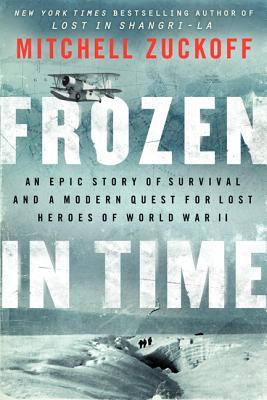 I've read another of Zuckoff's books, Lost in Shangri-La, which is about a rescue of a group of Americans who were in a plane crash in a remote area of New Guinea during World War II and ended up in a village that had very little outside contact prior to the crash and the Americans' arrival. With Frozen in Time, Zuckoff moved on to another island rescue mission, but instead of the tropics, this one goes to the Arctic, to the glaciers of Greenland.
I've read another of Zuckoff's books, Lost in Shangri-La, which is about a rescue of a group of Americans who were in a plane crash in a remote area of New Guinea during World War II and ended up in a village that had very little outside contact prior to the crash and the Americans' arrival. With Frozen in Time, Zuckoff moved on to another island rescue mission, but instead of the tropics, this one goes to the Arctic, to the glaciers of Greenland.There are two stories here: the historical, World War II crash-and-rescue story, and the modern story about the attempts to get a recovery mission up and running. In 1942, a plane crash in New Zealand leaves five men stranded, and the rescue attempts strand nine more in a different location. And the rescue attempts for the combined crews start stranding and claiming the lives of even more men. On top of everything, it's not expected that men can live more than a month on the glaciers of Greenland, and winter is bearing down.
I did find this book a little misleading. I knew several crashes were going to happen in this book, but when the modern chapters started, I got the distinct impression from Zuckoff's narrative that a lot more people died than actually did. Don't get me wrong, people die in this book--too many. But Zuckoff gives the impression early in the book that all of the stranded men died, and that the recovery mission was for all of them. Consequently, I spent much of the book going, "But how do they know this happened this way?" Well, they know because most the men from the B-17 plane that went down in search of the first plane made it out alive. The other parts of the story are left more in fog, because those people didn't make it out.
The modern part of the story is mostly comprised of negotiating for funding to get a recovery mission going. This guy named Lou wants to find the Duck, one of the rescue planes that went out, but he doesn't have the money to do it so he spends his time trying to get the funds from the US military, particularly the Coast Guard (who the Duck belonged to ). Zuckoff himself ends up pitching in a significant amount of money, at one point even agreeing to use his house as collateral for a loan--though the loan never actually goes through. This all made me raise an eyebrow at Zuckoff's judgment; while he's perfectly within his rights to spend his money however he wants, I definitely started to wonder how colored this narrative was by his desire to see it through, and I'm not sure that it's the role of the author (Zuckoff was already writing the book when he chipped in the money) to be so financially invested. Maybe that's weird of me, but I can't quite shake that feeling.
The rescue mission story is overall interesting, but the modern one is not. After the fundraising, there's a lot of shifting equipment around on ice, and the end of this is pretty apparent. Basically, it can only go two ways--they find the plane or they don't, and either way the book isn't long enough to include any sort of cover on the actual recovery mission, rather than the "let's find out where it is" mission. As a result, I felt kind of bummed and a bit deceived by the end of this, and it's made me a little leery of Zuckoff's other works, though I would still recommend Lost in Shangri-La.
I read this book for the 2017 Popsugar Reading Challenge for the category of "A book with a subtitle," the subtitle being "An Epic Story of Survival and a Modern Quest For Lost Heroes of World War II."
3 stars out of 5.
No comments:
Post a Comment